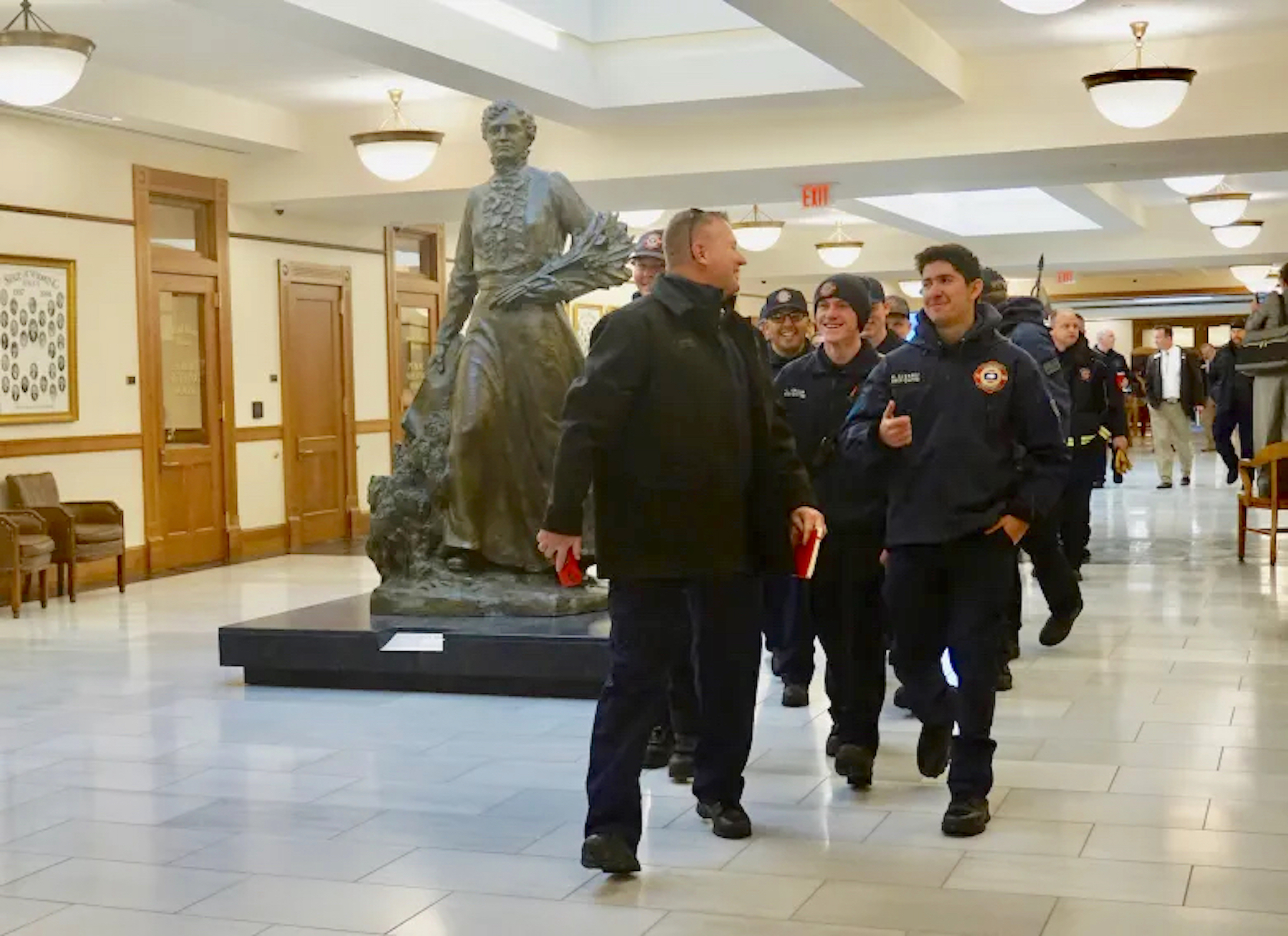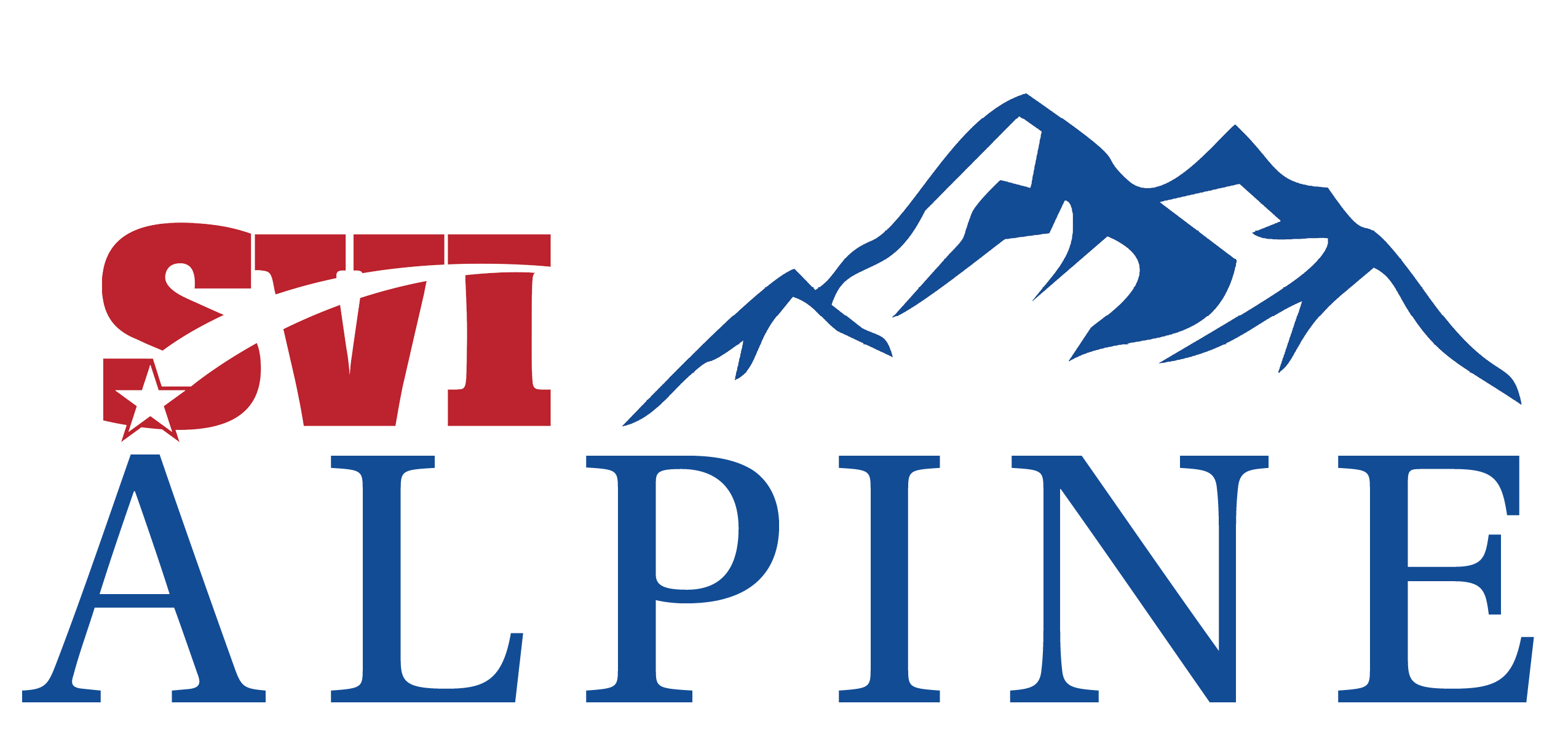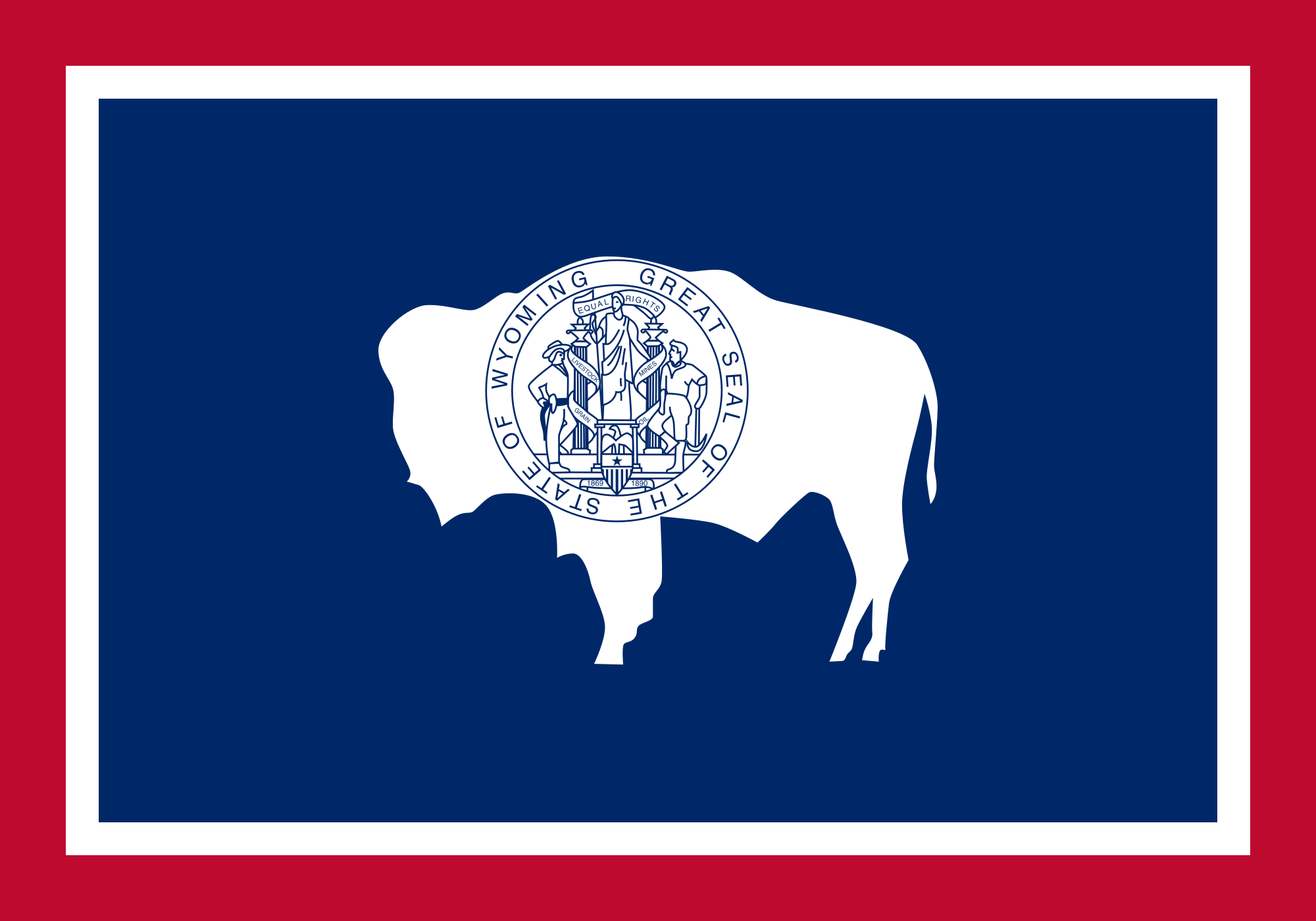Local governments protest Wyoming lawmakers’ property tax cut proposals
By Wyoming News Exchange
February 18, 2025

Laramie County Fire Authority Chief Jason Caughey leads a line of firefighters through the basement of the Wyoming State Capitol on Feb. 12. Fire chiefs and crews of uniformed men and women came to the Capitol this week to rally against a proposed property tax cut they say cut their budgets and compromise their readiness. (Andrew Graham/WyoFile)
Firefighters, sheriffs, community colleges and special districts are calling for targeted relief for homeowners in place of blanket cuts that will compromise local services.
By Maggie Mullen, WyoFile.com
CHEYENNE—The Laramie County Fire Authority gets a call about every five minutes, according to Fire Chief Jason Caughey.
Some of those calls are about fires, but most are for other needs — flooded basements, a fight or a medical emergency. Caughey told WyoFile that his unit responds to all such pleas for help — for now.
Uncertainty about whether that would continue brought Caughey to the Wyoming Capitol’s rotunda on Wednesday.
Flanked by dozens of other first responders from Goshen, Platte, Weston and Laramie counties, he urged lawmakers to pump the brakes on property tax cuts that are estimated to cost local governments and special districts millions of dollars in lost revenue.
If that legislation is enacted, Caughey said, he’s concerned his unit won’t “be able to respond to all of those events. We’re only gonna be able to respond to the most significant ones.”
Despite what some lawmakers tell voters, property taxes do not fund state government.
Instead, they pay for local services like county fire departments, K-12 education and transportation, senior centers, hospitals, water and sewer, community colleges, law enforcement, libraries and the construction and maintenance of roads and sidewalks.
But taxpayers don’t always realize that, Yoder Fire Chief Justin Burkart told WyoFile.
“When you go door to door and you ask them, ‘Hey, do you want to reduce your property tax?’ Everybody is going to say ‘yes.’ But what they don’t know is that property tax stays in the county, [and] provides services,” Burkart said.
In response to rising home values in several counties — and correlated spikes in tax bills — lawmakers passed five homeowner relief bills in 2024. Gov. Mark Gordon approved all but one.
This year, some lawmakers are seeking more significant reform and are expecting local entities to tighten their belts and rely on whatever reserves they may have. But that’s getting pushback — and not just from firefighters.
Special districts are speaking up, too.
“If you look at special districts, it’s from birth to grave,” Craig Haslam, President of the Wyoming Association of Special Districts, told WyoFile, alluding to hospital and cemetery districts being affected by property tax cuts. And if taxpayers don’t want to fund certain local services, Haslam said, lawmakers should let local voters make that decision for themselves via special district elections.
“Let the local folks make those decisions,” Haslam said.
Joining special districts, at least one Sheriff’s office and one community college are asking citizens to call their lawmakers in support of backing funding for local services.
Some legislators are already on their side.
“My position today is the same as the past,” Rep. JD Williams, R-Lusk, said at the Capitol demonstration. “A 50% property tax cut is an unwise policy change for Wyoming and for small town Wyoming in particular.”
Jackson Republican Rep. Andrew Byron, a volunteer firefighter, told WyoFile that House leadership is “digging in its heels” when it should be cautious about the repercussions of legislative decisions.
Sheriff’s office
The Laramie County Sheriff’s Office accused lawmakers of aiming to “defund the police” on its Facebook page. It took particular aim at Senate File 69, “Homeowner property tax exemption.”
As passed by the Senate and sent to the House, the bill would apply a 50% exemption on the first $1 million of assessed value for single-family homes for the next two years.
House Bill 169, “Homeowner Tax Exemption-2025 and 2026,” proposes identical cuts, but the House measure also provides a $125 million “backfill” to reimburse local governments for revenue lost to property tax cuts.
While SF 69 did not include a backfill, the Senate earmarked $15 million in its budget bill to reimburse special districts related to health and emergency management services.
“I urge our legislators to recognize that temporary measures, like SF 69, are merely a band-aid solution that could jeopardize the very safety we all depend on,” Laramie County Sheriff Brian Kozak wrote.
Kozak pointed back to last summer, when his office used some of its recruitment funds to place a billboard in Denver.
“Work in Wyoming where breaking the law is still illegal and cops are funded!” it read.
“It helped us attract professionals who moved to Wyoming because they believed public safety is valued by our elected representatives,” Kozak wrote on Facebook.
But property tax cuts, Kozak wrote, will force layoffs.
“I urge the Legislature to not California our Wyoming and take care of our first responders,” he wrote.

On its Facebook page, the Laramie County Sheriff’s Office accused lawmakers of aiming to “defund the police.” It took particular aim at Senate File 69, “Homeowner property tax exemption.” (Facebook screenshot)
Community college
The Central Wyoming College Board of Trustees is also ringing the alarm.
The trustees signed a special resolution Tuesday asking legislators to seek “targeted tax relief” that also “stabilizes funding” for local services.
The resolution calls upon voters to contact their elected representatives to “voice support for targeted tax relief and long term tax reform that continues to support local services, including local community colleges.”
According to the press release, the property tax cuts up for consideration would cost the college more than $1 million next year alone, requiring immediate reductions in the upcoming fiscal year that begins in July.
“Central Wyoming College works to further local economic development, provide top-notch education to Wyoming residents, provide cultural enhancing events, and employs more than 200 full-time and 400 other employees in Fremont, Teton and Hot Springs counties,” according to the press release.
House responds
Perhaps feeling the mounting pressure, the House made significant changes to SF 69 Thursday, adopting seven amendments.
The most dramatic change came from Rep. Ken Clouston, R-Gillette, who brought an amendment to give the bill a more targeted approach. More specifically, Clouston’s amendment proposes that the bill’s 50% exemption would be applied to how much a home’s value increased between 2019 and 2024 in place of the original 50% flat exemption.
This approach, Clouston said, accounts for the diversity of counties.
“Our problem is … since 2019, some of our counties and residencies have seen a massive increase in property taxes, but others haven’t,” Clouston said.
Eight counties collect less in property tax now than they did in 2015, according to an analysis by the Wyoming Taxpayers Association.
Clouston convinced several Freedom Caucus members and allies with this argument, including Sheridan Republican Reps. Ken Pendergraft and Tom Kelly, who both spoke in favor of it.
“This is the correct route to go,” Kelly said. “This addresses the problem in the most elegant way.”
Clouston’s amendment did not include an owner-occupied stipulation or a backfill, but said he was open to the former.
Rep. Martha Lawley, R-Worland, said she supported the amendment but that she’d still like to see the bill include a backfill.
“This doesn’t really take into account how much the county depends on property taxes,” Lawley said.
House Revenue Committee Chairman Rep. Tony Locke, a Freedom Caucus Republican from Casper, spoke against the amendment.
“Probably the biggest issue is, we’re trying to get some immediate relief into the hands of our people,” Locke said. “And the question is, can we make this work together with getting some immediate relief while we move in a direction like this?”
Rep. Art Washut, R-Casper, spoke in favor of the amendment, saying it moved away from punishing counties, like his own, that have learned to accommodate Wyoming’s booms and busts by building up reserves.
“Some of you haven’t even lived in our state during a time of a real bust, but those of us who’ve been around a while know just how awful those conditions can be,” Washut said.
A third of the Casper Police Department was laid off in a mid-1980s bust, said Washut, a former officer.
“So my city’s learned from those lessons, we put money away,” he said.
The bill passed second reading on a voice vote before Rep. Steve Harshman, R-Casper, brought a successful motion to lay back the bill until next Tuesday, and Rep. Mike Yin, D-Jackson, requested the Legislative Service Office provide an updated version of the bill with its new incorporations.
“I’m just making this motion, just so the public will be able to see what we’ve done for third reading,” Yin said.
Meanwhile, Senate leadership had not referred HB 169 to a committee at publishing time. The bill was received by the upper chamber on Jan. 24.
WyoFile is an independent nonprofit news organization focused on Wyoming people, places and policy.

